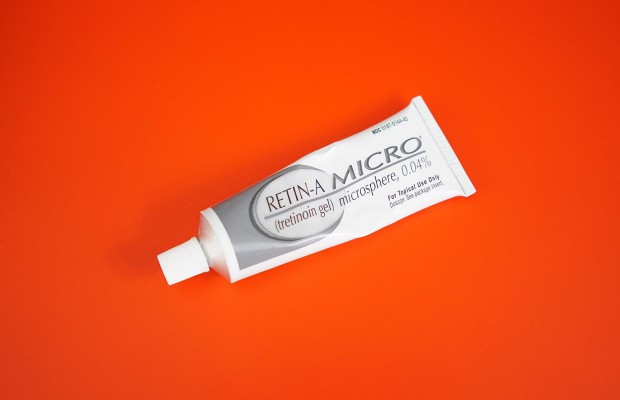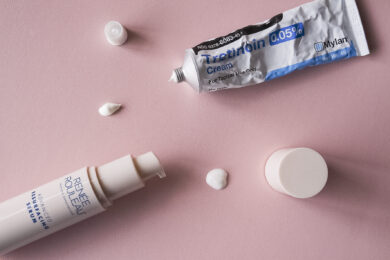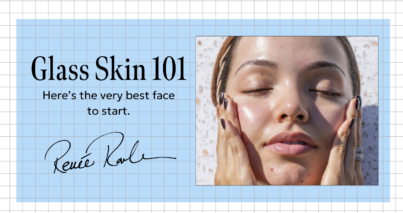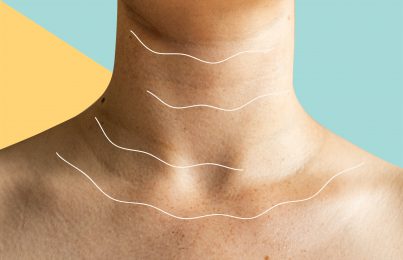Without a doubt, using topical vitamin A, with either a prescription retinoid or over-the-counter retinol applied on the skin several nights a week can truly make the skin look smoother and younger.
From resurfacing the texture by reducing lines, wrinkles and large pores to fading discoloration, you really need to be using this if you want to improve the look of your skin. Other than sunscreen, I believe it is truly the best biologically active ingredient because it’s backed by so many years of scientific proof. After all, every dermatologist on the planet endorses it.
Back in the late 80s when I first became an esthetician, I met a dermatologist who was instrumental in getting Retin-A FDA approved for the treatment of wrinkles and I have a great story to share about it in this video. If you’re curious about how vitamin A products work, you really should watch it. However, make no mistake; neither prescription retinoids nor the less potent retinol is a cure-all for every type of skin condition and they must be used in a very specific way to ensure the most effective results. I’ll explain the pros or cons for certain skin conditions to help you determine which is best for your skin type.
PRESCRIPTION RETINOIDS (RETIN-A, RENOVA, DIFFERIN, TAZORAC OR THE GENERIC NAME, TRETINOIN):
What it does: Retin-A was originally FDA approved for treating acne. It restores the organization of cells through cellular turnover in the epidermis so they are less likely to fall into the pores and block them resulting in fewer clogged pores and small breakouts. Years later, it was discovered to improve the look of wrinkles by retexturing and smoothing the skins’ surface and reducing pore size.
Who it’s good for: Since it’s excellent for encouraging cellular turnover that starts to slow down in your 30s, this makes it excellent for anyone wanting to prevent the look of aging. With continued use, it will fade hyper-pigmentation (brown spots and patches), encourage collagen and elastin production (to smooth wrinkles), and reduce the size of large pores.
For those who get closed comedones (smaller whiteheads, blackheads, bumps and clogged pores), it helps to restore the organization of cells through cellular turnover in the epidermis to reduce the bumps and smooth the skin. It’s very effective for fading discoloration (red, dark marks) leftover from acne scars as well as smoothing and reducing acne indents. Read how to use a retinol product.
Who it’s NOT good for: While Retin-A was originally a topical medication for treating acne, not all types of acne are equal. For those who get red, sore, inflamed acne (called papules and pustules), prescription retinoids may actually worsen the condition and increase irritation and inflammation in sensitive skin types. Acne is an inflammatory disease of the skin and inflaming this type of acne with retinoids is not the best strategy to getting clearer skin. It’s very common for people to find that a prescription retinoid can worsen their specific type of acne.
It’s also not good for anyone who isn’t serious about practicing sun safety. Daily use of sunscreen (applied generously) is crucial to seeing successful results with a retinoid.
Side effects: Dryness, increased sensitivity and peeling. With continued use, this will subside.
Summary: A prescription retinoid is very beneficial for age-prevention and can work on some types of acne but not all because every type of acne can be different. The type of acne that a prescription retinoid works best for is whiteheads, blackheads,closed comedones and general clogged pores—not inflamed pustular acne or cysts. For more red, inflamed, pustular types of acne that don’t get improvement from a prescription retinoid, use a gentle exfoliator that offers both antibacterial AND pore-clearing properties. For deep cysts, use a product specifically for healing these like Anti Cyst Treatment.
OVER-THE-COUNTER RETINOL (AVAILABLE WITHOUT A PRESCRIPTION AND FORMULATED TO BE GENTLER FOR SENSITIVE SKIN TYPES):
What it does: Retinol is a type of vitamin A that belongs to the family of retinoid chemical compounds. As long as the formula is stable (keeping it out of light, away from heat and time-released), it encourages repair to smooth the texture of the skin.
Who it’s good for: Since it encourages cellular turnover that starts to slow down in your 30s, it’s ideal for sensitive skin types who want to prevent the look of aging. With continued use, Retinol works to fade hyper-pigmentation (brown spots and patches) and give the look of smoother skin in a gentler, non-drying way than a prescription form.
For those who get whiteheads, closed comedones and general clogged pores, retinol can help smooth and clear this condition with continued use, but a slower result than a prescription retinoid.
Who it’s NOT good for: For those who get red, sore, inflamed acne (papules and pustules), retinol will generally not give any improvement for this type of breakouts and may increase inflammation and breakout activity. Retinol (and Retin-A as mentioned above) is simply not the best approach for clearing and preventing the formation of large, infected blemishes.
It’s also not for anyone who expects to see immediate results. Since it’s milder in its vitamin A activity, it will take longer to see the smoothing benefits. Be patient, it will work the same as a prescription retinoid with continued use.
Lastly, it’s also not good for anyone who isn’t serious about practicing sun safety. Daily use of sunscreen (applied generously) is crucial to seeing successful results with a retinoid.
Side effects: Some people may experience some initial tightness or light dryness but generally most will not have any noticeable negative effects.
Summary: Retinol is very beneficial for age-prevention (smoothing and reducing the look of wrinkles, brown spots and large pores) and is best for those whose acne years are behind them. As for red, inflamed, pustular type acne, these type of blemishes require both exfoliation and reducing bacteria in the pore lining WITHOUT causing inflammation and so retinol is not the best choice. Again, a well-formulated salicylic serum like BHA Clarifying Serum will be more effective.
Note: Retinyl Palmitate is the ester form of Retinol and Palmitic Acid and acts as an effective antioxidant and skin cell regulator. It works differently than the vitamin A derivatives mentioned above and will not yield the same skin-smoothing benefits.
I personally use Advanced Resurfacing Serum and recommend it to all my sensitive skin clients but a prescription retinoid is very effective, too. New to retinol or retinoids? Read my beginner’s guide for helpful tips.
Read: 8 Tips to Prevent Chin And Jawline Breakouts
Read: What’s The Best Spot Treatment For Blemishes?
Read: Here’s Proof That Using A Vitamin C Serum Really Helps Your Skin
Which skin care products are best for you? See our nine skin types or take the Skin Type Quiz and get products recommended.
Need expert advice from a licensed esthetician? Schedule a virtual consultation to get customized advice in person, over the phone or online via Skype or FaceTime.
For more expert advice check out the blog. Also sign up for our skin tip e-newsletter, follow Renée Rouleau on Twitter and Instagram and join the discussion on our Facebook page. You’ll be your own skin care expert in no time. Get the #ReneeRouleauGlow!
Celebrity Esthetician & Skincare Expert
As an esthetician trained in cosmetic chemistry, Renée Rouleau has spent 35 years researching skin, educating her audience, and building an award-winning line of products. Her hands-on experience as an esthetician and trusted skin care expert has created a real-world solution — products that are formulated for nine different types of skin so your face will get exactly what it needs to look and feel its best. Trusted by celebrities, editors, bloggers, and skincare obsessives around the globe, her vast real-world knowledge and constant research are why Marie Claire calls her “the most passionate skin practitioner we know.”




Comments:
This article provides useful information on various anti acne skincare options available, their effectiveness, and costs. I really liked it very much. Overall, it can be a helpful guide for those looking for acne scar treatment.
Posted By: Certified Aesthetic |
Is it safe to use a prescription retinoid on the neck and decolletage? I have had 1 Dermatologist say not to and another say yes.
Posted By: Nancy |
Hi Nancy, it depends on your skin. While it’s not unsafe, the skin on the neck is quite thing and therefore prone to irritation. If you don’t have very sensitive skin, you can try mixing your retinoid with a little moisturizer and applying it to the neck once a week, then slowly working up to 2 or 3 nights a week from there. If you start to experience dryness and irritation, you may want to look for an over the counter retinol like my Advanced Resurfacing Serum to use on your neck. These are still effective but a lot less irritating than their prescription counterparts. Hope this helps!
Posted By: Renée Rouleau |
We are based in Texas but we do not offering continuing education courses. Reading my blog is a great way to expand your knowledge.
Posted By: Renée Rouleau |
I love your skin care line and have been incorporating many of your products into my daily routine for over a year now. I’m considering adding in the BHA Clarifying Serum into my routine. However, I already use Tazorac nightly. Is this safe to add in? Thank you!
Posted By: Blair |
Yes, you can definitely use the BHA Serum but not on the same nights as the Tazorac. Follow these instructions that we have on the page for our retinol product (Advanced Resurfacing Serum), but where it says to use our retinol, you would use your Tazorac.
Posted By: Renée Rouleau |
Great info! I just found your website last week and have been reading and absorbing it all! Thank you for sharing it all! I was curious if using a Retinol product was ok with mild rosecea? I have used a gel before and want to do it again but have the starting of rosecea (cheek area) and def don’t want to upset it! Thanks again!
Posted By: Hannah |
Thanks so much, Hannah. I’m so glad you’re learning so much from my site. A prescription retinoid generally isn’t ideal for rosacea-prone skin but an over-the-counter retinol formulated for sensitive skin shouldn’t be a problem. Of course, every product is different and all are not equal so you may just have to try one and see how it goes.
Posted By: Renée Rouleau |